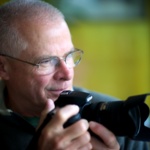Interviewer: Tasha Galardi
Interview Date: November 21, 2008
Location: Strand Agriculture Hall, Oregon State University
Duration: 2:05:18
Gwil Evans’ oral history interview covers a variety of topics, including changes in the purpose of the university, expectations for young men when he was growing up, changing attitudes towards sexuality, and his passion for photography and journalism.
The interview begins with Evans (b. 1939) discussing the origins of his name and details of his childhood in Portland. It was here that he obtained his first camera and learned more about photography from a neighbor. He then talks about moving to the small coastal town of Nelscott in the sixth grade, a beachfront community that later became part of Lincoln City, Oregon.
While describing his youth in Nelscott, Evans discusses his early interest in photography, and the different events that allowed his interest to flourish. Of particular note, he became a stringer for The Oregonian, which simultaneously piqued his interest in journalism. Nelscott was a rural community, and while talking about the expectations for young men at the time of his graduation from high school, he also touches on how very few from his high school continued their schooling.
After high school, Evans attended Reed College in Portland for one year, majoring in Chemistry. After a negative freshman experience, he decided to transfer to Oregon State University, where he began studying General Science. At OSU, he began to find his place amongst writing courses and as a journalist for The Daily Barometer, noting in particular the influence of his journalism professor, Adelaide V. Lake.
Evans graduated from Oregon State in 1961, with a degree in General Science and a minor in journalism. After graduation, he worked for the Associated Press, and describes how exciting it was to be in the workroom, around professional journalists. From there, he enrolled in Stanford University’s Masters of Communication Research program, and graduated in 1962.
After leaving Stanford, Evans served his country during the Vietnam War by enlisting in the United States Air Force. While there, Evans supported National Media Relations at the Strategic Air Command Headquarters in Omaha, Nebraska. Reflecting on this experience, Evans talks about homosexuality in the military at this time, and the repercussions that gay servicemen could face were they outed.
After leaving the military, Evans started working for Oregon State University. He describes the numerous positions that he held during his long career at Oregon State including as Assistant Editor for the Oregon Agricultural Experiment Station’s publications unit and, in tandem, as a professor in the Department of Journalism. He also discusses changes in the university from when he was a student through the end of his career.
Evans concludes the interview by recounting how he met his partner, Bill, and coming out to their families. He also talks about the life he and Bill have built, with particular focus on the energy and care that they have devoted to a Japanese Sukiya garden in the backyard of their Corvallis home.
Dublin Core
Title
Description
The interview begins with Evans (b. 1939) discussing the origins of his name and details of his childhood in Portland. It was here that he obtained his first camera and learned more about photography from a neighbor. He then talks about moving to the small coastal town of Nelscott in the sixth grade, a beachfront community that later became part of Lincoln City, Oregon.
While describing his youth in Nelscott, Evans discusses his early interest in photography, and the different events that allowed his interest to flourish. Of particular note, he became a stringer for The Oregonian, which simultaneously piqued his interest in journalism. Nelscott was a rural community, and while talking about the expectations for young men at the time of his graduation from high school, he also touches on how very few from his high school continued their schooling.
After high school, Evans attended Reed College in Portland for one year, majoring in Chemistry. After a negative freshman experience, he decided to transfer to Oregon State University, where he began studying General Science. At OSU, he began to find his place amongst writing courses and as a journalist for The Daily Barometer, noting in particular the influence of his journalism professor, Adelaide V. Lake.
Evans graduated from Oregon State in 1961, with a degree in General Science and a minor in journalism. After graduation, he worked for the Associated Press, and describes how exciting it was to be in the workroom, around professional journalists. From there, he enrolled in Stanford University’s Masters of Communication Research program, and graduated in 1962.
After leaving Stanford, Evans served his country during the Vietnam War by enlisting in the United States Air Force. While there, Evans supported National Media Relations at the Strategic Air Command Headquarters in Omaha, Nebraska. Reflecting on this experience, Evans talks about homosexuality in the military at this time, and the repercussions that gay servicemen could face were they outed.
After leaving the military, Evans started working for Oregon State University. He describes the numerous positions that he held during his long career at Oregon State including as Assistant Editor for the Oregon Agricultural Experiment Station’s publications unit and, in tandem, as a professor in the Department of Journalism. He also discusses changes in the university from when he was a student through the end of his career.
Evans concludes the interview by recounting how he met his partner, Bill, and coming out to their families. He also talks about the life he and Bill have built, with particular focus on the energy and care that they have devoted to a Japanese Sukiya garden in the backyard of their Corvallis home.

